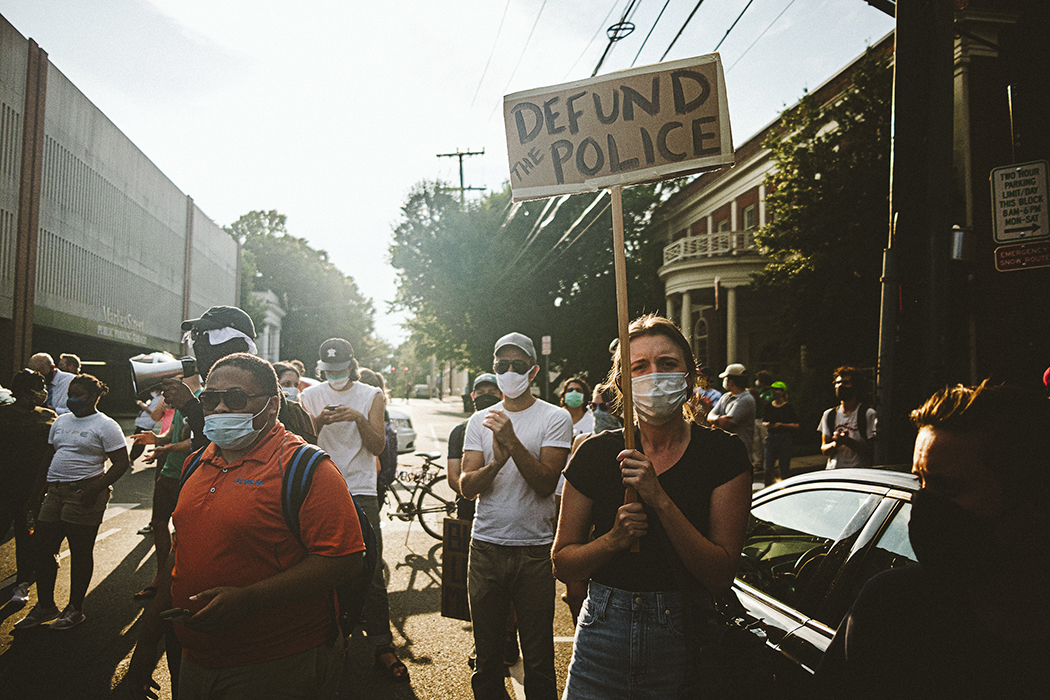Last summer, hundreds of people took to the streets of downtown Charlottesville, demanding justice for Black people murdered by police across the country. Many protesters urged the city to drastically reduce the Charlottesville Police Department’s $18 million budget, and reallocate those funds toward community services, including mental health treatment.
Thanks to new legislation, a mental health crisis unit could soon be coming to Charlottesville. In November, the Virginia General Assembly passed the Marcus-David Peters Act, named in honor of a 24-year-old Black high school biology teacher killed during a severe mental health crisis in 2018 by a Richmond police officer.
The act directs localities to limit the role of law enforcement in mental health crises, instead establishing a Marcus Alert system to bring non-police responders into the fold. By July 2022, the city must create a 988 phone number for mental health crises, and develop a response protocol defining when law enforcement will—and will not—need to be involved in answering calls.
In January, a work group—including city councilors, community leaders, emergency services professionals, and individuals who have experienced mental health crises—began exploring how to create a new mental health response system in Charlottesville. Last week, the group presented its findings to City Council, alongside the Imagining A Just Cville work group.
Mental health advocate Myra Anderson, co-chair of the Marcus Alert group, explained how police have mistreated her during many of her mental health crises. She also highlighted the cases of Black people who were killed by police while experiencing a crisis, including Corrine Gaines, Deborah Danner, and Anthony Hill.
“There have been times where I’ve found the police to be very helpful, [and] there have been times when things have gone horribly wrong,” said Anderson. “But I feel like when I’m in a crisis, I shouldn’t have to play Russian roulette with how they are going to show up.”
Lieutenant Larry Jones, who works with CPD’s crisis intervention team, expressed his support for the Marcus alert system. Responding to mental health calls is often very time consuming and costly for police, he said. He suggested the department create a specialized mental health unit specifically for high-risk calls requiring police intervention.
In order to establish a robust response system, mental health care professionals and facilities will need a lot more funding and community support, explained Region Ten Executive Director Lisa Beitz. In July, five of Virginia’s eight state-run mental hospitals stopped accepting new admissions due to staffing and capacity issues. Many people experiencing mental health crises have had to spend days with a police officer in their local emergency room, waiting for a bed to be available at a state or private mental hospital.
Representing the Imagining a Just Cville work group, which was organized by Mayor Nikuyah Walker last year, Neal Goodloe of the Jefferson Area Community Criminal Justice Board shared the results of his study on crime in Charlottesville over the past decade. Though reported crime has decreased by similar percentages among Black and white residents, Black people are more likely to be arrested and incarcerated, and white people are more likely to stay in jail for less than a day.
Charlottesville resident Wanda Smith, Walker’s cousin, spoke about how her family has been impacted by mass incarceration. While her brother and sister were incarcerated for over a decade, she had to help raise her nieces and nephews, preventing her from pursuing her own life goals. Raylaja Waller of City of Promise discussed how seeing her father go in and out of jail deeply affected her as a child, and she advocated for more grassroots re-entry programs.
CPD intern Nancy Amin, a University of Texas School of Law student, highlighted the effects of officer discretion during arrests, using recent police department data. She described a traffic stop involving a white woman who admitted to driving drunk, but started crying and claimed that another CPD officer was her best friend. The woman was allowed to park her car and take an Uber home, and was not arrested. During a similar traffic stop involving a Hispanic man, the officer became impatient because the man did not speak English. The man did not understand the officer’s request for a sobriety test, but the officer arrested him for “refusing” the test, and he was found guilty of a DUI. (The charge was later dismissed.)
To take discretion away from officers, former CPD chief RaShall Brackney—who continues to work with the group despite her recent firing—suggested the city create a diversion program that people accused of certain offenses could opt in to before being arrested or charged.
City Manager Chip Boyles expressed his support for the recommendations and a willingness to get to work on them.
“These are just really starting points,” said Walker. “There’s a lot of work still left undone, and those things are going to require some funding [and] whoever is at the table in the city to see the vision.”
